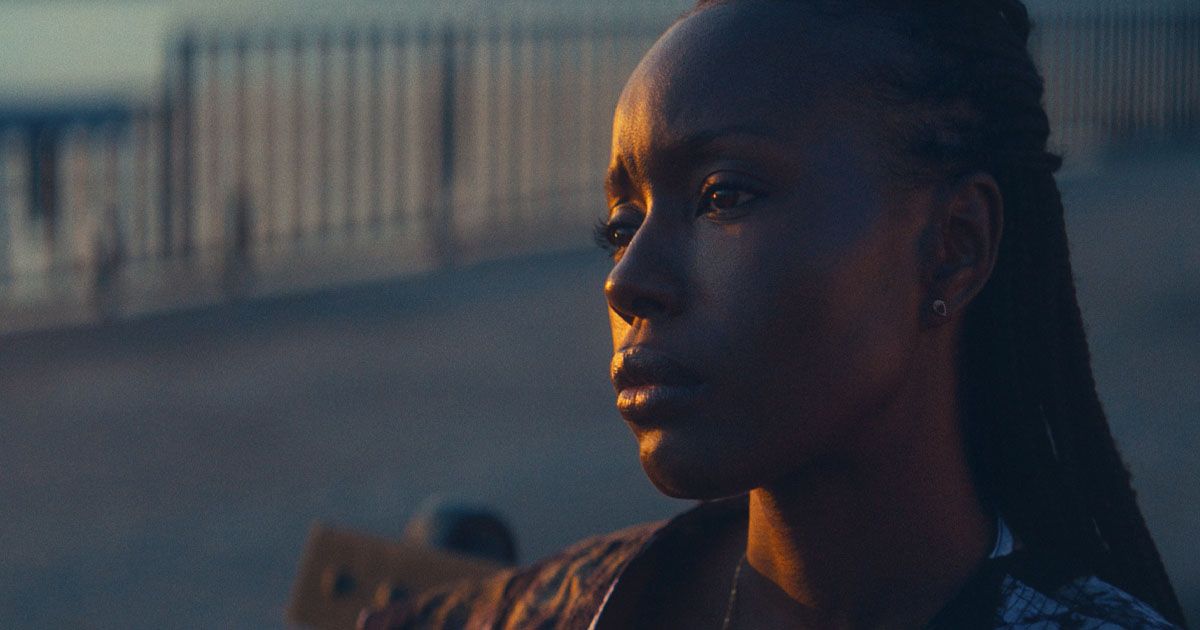In what must be one of the most captivating performances of the year, Anna Diop commands the screen in Nanny, the impressive debut from writer-director Nikyatu Jusu. The film hit Sundance earlier this year, becoming the fest’s top prize winner. It recently wowed Chicago International Film Festival audiences with Diop, in fact, walking away with the “Festival’s Rising Star” award.
Nanny is a psychological thriller that chronicles Aisha, an African woman (Diop), who hopes a new nanny job will help bring her young son to the United States. But between the child’s off-putting parents (Michelle Monaghan and Morgan Spector) and a foreboding presence that invades both her dreams and reality, suddenly everything Aisha has ever loved and stood for are jeopardized.
The film also stars Sinqua Walls, Rose Decker, Leslie Uggams, Olamide Candide-Johnson, and Jahleel Kamara.
“I hope the film creates a deeper empathy for the individuals who sacrifice and navigate so much—immigrants, mothers, people who are so much a part of our daily lives who honestly uphold the system we all live in,” Diop told MovieWeb at the festival. “A lot of families rely on domestic workers—nannies, housekeepers—and we pay them what we pay them, but they uphold our ability to be able to go out, work, and have the lifestyles we want.”
Diop is a pleasure to connect with and in conversation, she evokes a refreshing sense of depth and grace. She went on to note that, “across the board, if you go to any establishment, the people who are working are being paid very little. Because of that, we're able to pay afford and experience something we want. It’s all very economic. So, with the film, I hope people gain a deeper empathy for the people around them who uplift their lives.”
On Finding Similarities With Her Character
Diop is a Senegalese-American actress and model. For the last four years, she’d turned heads portraying Kory Anders on the HBO Max/DCU series Titans. She’s also been a series regular on The Messengers and has starred in Bosch, 24: Legacy, and Greenleaf. When Diop read the script for Nanny, she immediately saw parallels between herself and Aisha, a Senegalese immigrant working for an affluent Manhattan family.
“There were many similarities between me and Aisha—the experience of being in a new place that's foreign, the experience of being ‘alien,’ the experience of being hyper-attentive, the experience of survival. Those are very familiar to me,” Diop said. “More specifically, being from Senegal and an immigrant working in domestic work. My mother worked as a nanny for many years. I know that experience and that world very well. And also, the kinds of loneliness that come from being an immigrant and being in a new place.”
Diop pinpointed another similarity: depression. In the film, Aisha is plagued over bringing her son (played by Kamara) to America.
“The depression she's experiencing stands out,” she added, “the loneliness and the guilt. I have guilt. Even though coming to America wasn't my choice, and I'm very glad my mother did that, I still have family back home, and it's painful to see them not have job opportunities or to be able to build the lives they deserve because of the lack of resources and opportunity. I carry a lot of guilt about that.”
She noted Aisha's guilt over temporarily leaving her child behind in the film. “I pretty much know those kinds of emotional throughlines intimately.”
When asked how she herself deals with various forms of guilt, Diop opened up further.
“I try to live my life in a way that's gracious and full,” she said. “And to take full advantage of all the opportunities I have because that's the best way to honor the sacrifices of my parents. I try to live my life in ways that would make my family back home proud. But it's a tricky thing. I think people do find a way to move past guilt, but it's always on my heart.”
Diop said she’s often pondered both her family and immigrant workers during various press tours, when she’s had to stay in various hotels.
“You see the housekeepers come in, and for me, it's different because I know these women. These are our aunts and our mothers. They’re not just people in our periphery. So, it’s very interesting to navigate being in these spaces—of both being served but being very connected to who's serving you. It’s a constant push and pull.”
On Working With Nikyatu Jusu
Writer-director Nikyatu Jusu is a force all unto her own. From her work as an assistant professor in film and video at George Mason University to her thought-provoking turn with her short film, Suicide by Sunlight, Jusu's works illuminates the complexities of Black female characters, particularly, displaced, immigrant women in America.
“She's unlike anyone I've ever worked with and I've done, at this point, almost 150 episodes of television,” Diop said of Jusu. “Jusu has a very original point of view. She does things in ways we aren't used to seeing. She's inspired by the truth of her experience in her life. And because of that, things come across as authentic.”
It surely does in Nanny. As the film progresses, Aisha is tormented by visions. Or dreams? Hard to say. And maybe that’s the point. Are they real? Or not? By the film’s final act, the director has taken the audience on a heart-pounding journey that fully captures the wild paths the mind can take, the surrealness of life itself, and the (divine?) grace that occasionally steps in.
“We haven't seen a lot of work from black female directors,” Diop noted. “It was a privilege just being in Jusu’s orbit and knowing that I was existing safely in a place she's built and being taken care of properly—even with such things as being properly lit or if my hair looked crazy, she’d catch it because she's a black woman, and she knows what she's looking at. I trust her as a filmmaker.”
Diop said she caught the acting bug when she was 13 years old. She’s been “really obsessed” with the craft of it ever since. When asked if there were any inspirations along the way, she quickly noted Whoopi Goldberg.
“When I saw The Color Purple, it was the first time that I'd seen a dark-skinned woman in a protagonist role, and somebody who was layered and so nuanced. The character had a wonderful arc,” Diop said. “She starts off one way, then finds her power. And Whoopi’s performance is so gorgeous. That film was huge for me. I said, ‘I want to do that.’”
On that note, Diop is candid about what kinds of films she’d loved to see populate the big screen. “I’d love to see more original stores. Seems like we’re remaking so much stuff. I understand because it's a business and the people who fund projects aren't necessarily always artists. They're just people who look at numbers. And they say, ‘Well, this project made this much in 1995, and we’re going to recreate that, right?’ They're basing it off logic. Oftentimes it works. Sometimes it doesn't.
“I would love to see more protagonists that we're not used to keeping our gaze on,” she added. “But it’s an exciting time because that’s beginning to happen. We see somebody like Michelle Yeoh (Everything Everywhere All at Once)—finally, this brilliant actress getting the space to work. I want to see more of her; protagonists we’re not used to seeing.”
Nanny will be released in theaters in December.


